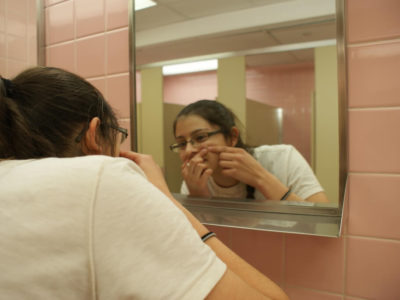Can’t help but to wonder why you are suddenly breaking out now that you’re in college? Thought acne was just a middle school and high school problem? Not quite. Acne affects everyone at some point, normally after puberty when oil production in the skin is revved up. By now, many students believe they have seen their last whitehead, blackhead and cyst.
Yet even the most seemingly perfect skin can suddenly have an acne flare-up. But why? Unfortunately, not everyone has skin as flawless as Hayden Panettiere:
“There are many causes for acne and many factors that can play a role and exacerbate acne,” said Baltimore-based dermatologist Dr. Faith Esterson. “Hormones, stress, oiliness, sticky skin cells and bacteria all contribute to the various forms of acne including comedonal, papular/pustular, nodular/cystic acne.”
There are certain things you can do to prevent, clear and help your skin to prevent breakouts and help heal them if they do happen.
First off, eat right. The Mayo Clinic reports that some foods like bagels, bread and chips can cause acne because they are all contain carbohydrates that turn into sugar. Dairy products can lead to acne as well. This does not mean you should stop eating all dairy and carbohydrates –- moderation is key.
“I broke out a little more than usual in the beginning of college because of the food I was eating,” said University of Maryland student Sam B., who noticed a correlation between her college-induced dietary changes and skin breakouts.
You do not need to cut out all fatty but tasty foods forever. Contrary to popular belief, chocolate does not cause acne!
Moving on: do not over clean your face. Acne.org reports that while washing your face twice a day is good, over-washing can irritate skin cells.
“I do have a regimen in the morning and night that I follow religiously so that I don't have obscene break outs,” said Elon University student Courtney V.
Follow her example and stop rubbing your face with a washcloth until your skin is pink. You could wake up with more zits the next morning.
Next: do not ever EVER pick at a zit. “It is never a good idea to pick or scratch at acne as this can lead to infection or scarring,” said Esterson.
While the zit may annoy you, the scar it could cause if picked will last much longer. If a certain zit is making you feel like you have a mountain on your face, try using makeup to cover it up.
“My friends who I know have or have had acne learned either how to effectively use concealer or, as far as I know, their acne simply got better as college progressed,” said New York University student Javon B.
Browse the local drug store for cleansers or night creams that are formulated to eradicate acne. Normally topical medications at drug stores that target acne either employ benzyl peroxide, which kills bacteria (and bleaches clothes), or salicylic acid to fight acne on the surface.
“It is best to consult a dermatologist when over the counter medications when used correctly fail to improve acne after 10 to 12 weeks of use or sooner if there is evidence of acne scarring,” said Esterson.
Internal medication like Accutane, Spironolactone, and antibiotics can be prescribed only through a dermatologist, and all have shown to improve acne. A dermatologist can also give you a cream that is stronger or is not sold over the counter that can take away acne.
“Unfortunately acne can last for years,” said Esterson. “There is no sure way to determine who will have acne for a short period of time and ‘outgrow it,’ or who will have acne for many years requiring some type of treatment."



















